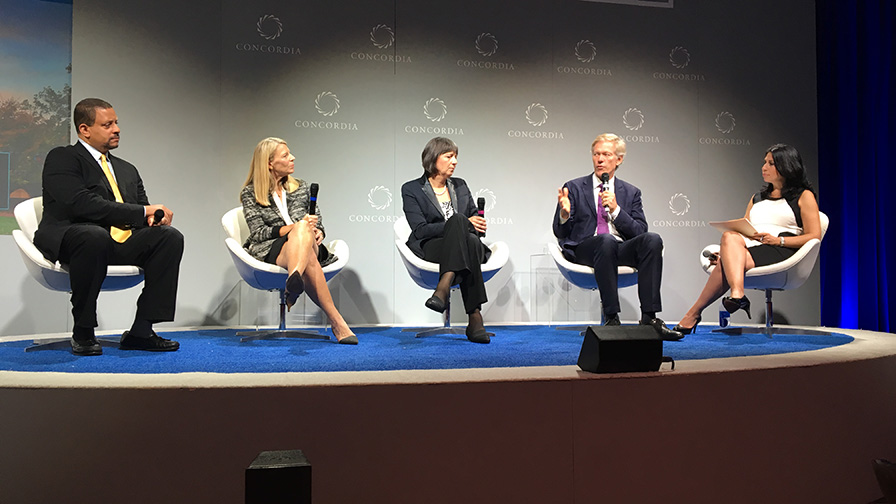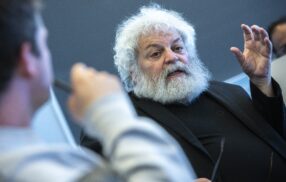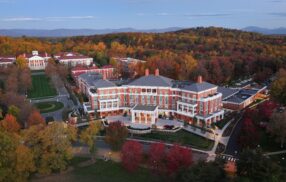
‘Like a Mini-Silicon Valley:’ B-Schools Launch Adaptable, Innovative Leaders Prepared for Complex World
By Jay Hodgkins
To Yahoo Finance news anchor Alexis Christoforous, the University of Virginia Darden School of Business “sounds like a mini-Silicon Valley.”
Her reaction came during The New MBA: Business, Partnerships and Tackling Global Challenges panel at the 2016 Concordia Summit after Darden Dean Scott Beardsley described how the School is preparing MBA students to be both entrepreneurs and more innovative in whichever career fields they ultimately choose. MasterCard CFO Martina Hund-Mejean (MBA ’88), Save the Children President and CEO Carolyn Miles (MBA ’88), My Brother’s Keeper Alliance CEO Blair Taylor and Christoforous as moderator joined Beardsley on the panel, which showcased the Darden community’s leadership supporting the summit’s goal to foster effective public-private partnerships to create a more prosperous and sustainable future.
Beardsley listed a series of keys Darden uses to prepare students to create a better future despite the complex challenges facing the world:
- Enrolling a global and diverse student body, which is necessary so that students can gain exposure to unique global perspectives from their peers on all of the issues they are studying
- Teaching to see through different lenses, so students learn how various stakeholders view their future organizations and can create value for all groups
- Offering experiential learning, which enables students to think on their feet and become skilled communicators
- Preparing general managers, which means preparing students to be like entrepreneurs, capable of dealing with all of the issues a company might face
- Providing resources like the W.L. Lyons III i.Lab, the i.Lab Incubator and global consulting projects so that students have the opportunity to get out in the world and do real work as entrepreneurs or to prepare for a specific career
MBAs Learn the Art of Partnering to Tackle Complex Challenges
The panel focused on how preparation through business schools prepares MBA graduates for the complex, ambiguous and quickly moving world today where businesses, nonprofits and the government are discovering they can only effectively address their largest challenges in partnership with each other.
Hund-Mejean said she has had to rely on lifelong learning to successfully navigate this more complex world, as MBA programs when she was a student were not teaching the skills needed to understand how to partner with nonprofits or the government. However, she said today’s MBA graduates are prepared to be adaptable and have the diverse set of skills so highly sought after by companies like MasterCard.
Miles agreed with Hund-Mejean’s assessment of the changing business world since they left Darden in 1988, noting how Save the Children is now partnering with “half of the Fortune 500 and many other small companies.” These partnerships are forming because the public, private and nonprofit sectors are realizing they often share the same broad goals and can help each other. For example, Save the Children has built a global partnership with Johnson & Johnson that started with the simple premise that “we care about mothers and babies and they care about mothers and babies.”
What’s more meaningful, Miles said, is that more innovative companies are engaging in partnerships with nonprofits like Save the Children being led within operating business units, as opposed to the old model where a nonprofit might only work with a company’s philanthropy divisions.
GlaxoSmithKline partnered with Save the Children to formulate a new product that was rolled out in hospitals around the world, Miles said. The partnership helped the company’s bottom line and resulted in the successful launch of a product that advanced Save the Children’s goal to stop the preventable deaths of children.
“It never could have done that with the philanthropic division of the company,” Miles said.
“Corporate America is awakening now to the reality that they must do well and do good, and that is opening new doors,” Taylor said. “Corporate America understands it is a business imperative, so partnerships are moving out of the philanthropy division into the engine of the company because neither sector can fix all of these problems on their own.”
MBAs Capturing the Value of Options
Whether learning adaptability and flexibility in business school or forging an era of deeper public-private partnerships, Beardsley said the connecting trend is that today’s business leaders need to increase their options.
“Many of the jobs and industries of tomorrow have yet to be created. If you look back 20 years, we couldn’t have imagined the Facebooks and Googles of today,” Beardsley said. “In an environment of increasing volatility, the value of options goes up.”
Beardsley said he tells Darden students or those considering an MBA that if they don’t know exactly what they want to do, but they aspire to make change in the world, business school is a great option.
“Business school is actually becoming more relevant today,” he said. “Not just through the MBA, but lifelong learning. People need to keep learning as they go through their career.”
With a potential 40-year career after earning an MBA, the typical graduate will have to constantly change and learn new skills in today’s volatile business world. However, the adaptability and flexibility business schools like Darden teach will guide them.
“I am jealous of today’s MBAs because they will have such a diverse spectrum of careers,” Taylor said. “When I was an MBA in the ‘90s, they said ‘you will have three or four careers,’ and that was a huge difference from my dad. But now, you might have eight or 10 careers.”
The University of Virginia Darden School of Business prepares responsible global leaders through unparalleled transformational learning experiences. Darden’s graduate degree programs (MBA, MSBA and Ph.D.) and Executive Education & Lifelong Learning programs offered by the Darden School Foundation set the stage for a lifetime of career advancement and impact. Darden’s top-ranked faculty, renowned for teaching excellence, inspires and shapes modern business leadership worldwide through research, thought leadership and business publishing. Darden has Grounds in Charlottesville, Virginia, and the Washington, D.C., area and a global community that includes 18,000 alumni in 90 countries. Darden was established in 1955 at the University of Virginia, a top public university founded by Thomas Jefferson in 1819 in Charlottesville, Virginia.
Press Contact
Molly Mitchell
Associate Director of Content Marketing and Social Media
Darden School of Business
University of Virginia
MitchellM@darden.virginia.edu




